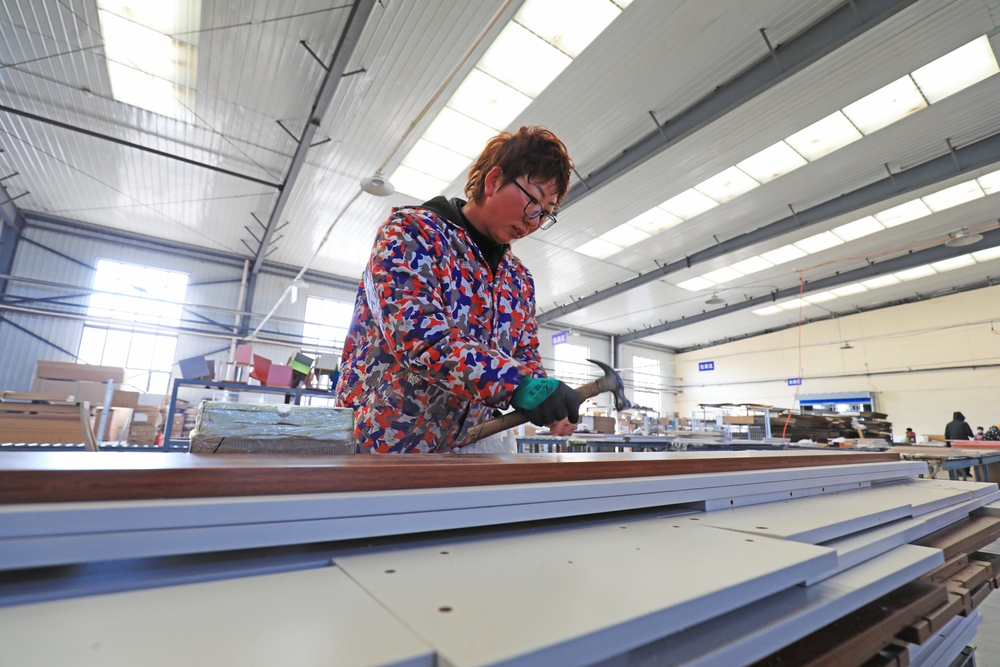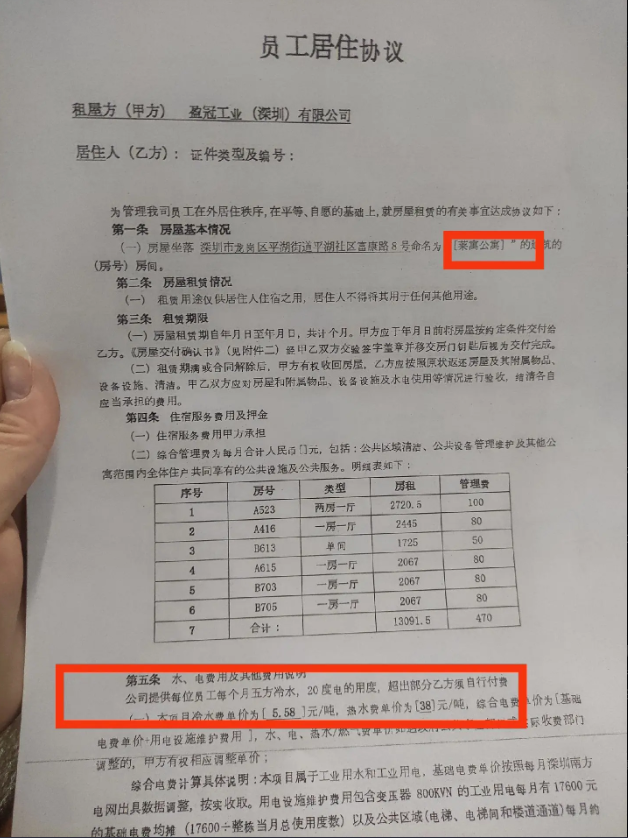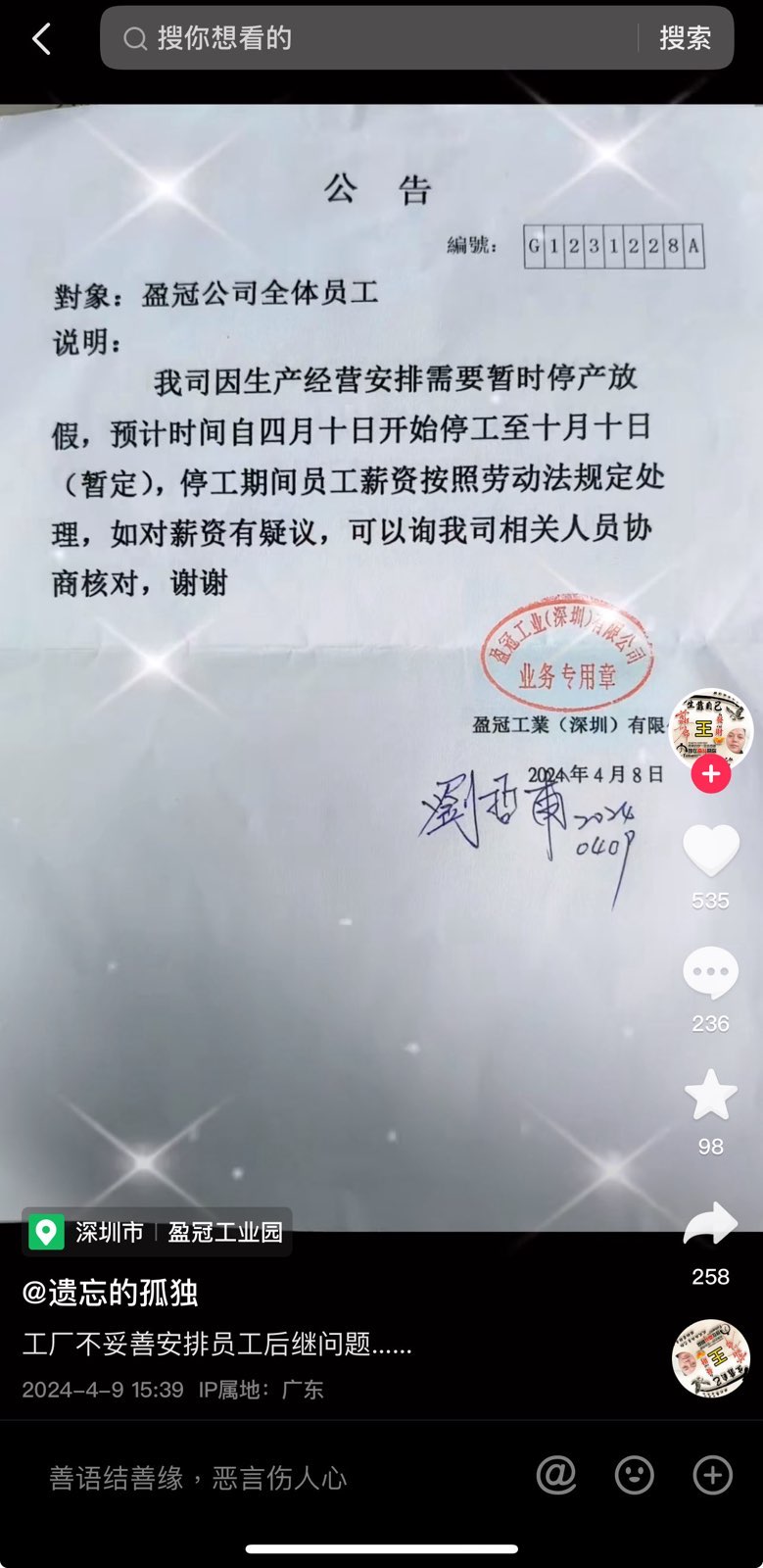On April 8, 2024, Yingguan Industrial (Shenzhen) Co., Ltd., located in Shenzhen, Guangdong, issued a notice informing workers that it would halt production from April 10 to October 10, while wages would be paid according to labour law during the furlough. On the second day, Yingguan workers gathered in front of the factory to protest against the company's use of furlough to avoid paying legally mandated severance (see more at Strike map link).
Yingguan Industrial (Shenzhen) Co., Ltd. is a Taiwanese enterprise primarily engaged in the development and production of metal products and wooden furniture. As a large-scale industrial enterprise, Yingguan Industrial was recognised from 2016 to 2020 as the Guangzhou Manufacturing Top 500 Companies and received various honours such as “Top 100 Export Enterprises in Shenzhen,” “Major Taxpayer in Shenzhen,” and “Trusted Enterprise by Shenzhen Consumers”. According to its parent company, Yingtai Group, all its products are for export, with major buyers including IKEA, Samsung, Tesco, Costco, Walmart, and Carrefour.

Photo credit: chinahbzy / Shutterstock.com
There were early signs of Yingguan's shutdown, but the future of the employees and their salary arrangements remain unclear
Signs of scaling down and eventual shutdown of Yingguan had appeared long before the April 8 holiday notice. As early as January 16 of this year, four months before the sudden announcement of the furlough, workers had posted videos online saying, "The factory workshop has been reduced. There used to be several workshops, but now everything has been reduced to one workshop." They added, "Boss, just compensate us quickly so we can leave; stop dragging this on..." On January 24, another worker posted a video online saying, "The fourth floor of Yingguan's factory, which was used for coating and packaging, has been dismantled and rented out now."
On March 15, yet another worker posted a video saying, "The once-thriving Yingguan company has now sold the gantry welding system, turnover racks and moulds as scrap." The factory gradually moved out its machines, leaving behind empty workshops, and the workforce had dwindled from over 2,000 to just over 200.
Moreover, the remaining employees felt they were forced to resign voluntarily as the company gave meagre wages and raised living costs. Some workers posted videos pointing out that the Yingguan company was increasing accommodation costs. According to a company notice shared by workers, the water and electricity fees were exorbitantly high. A worker said,
"Is the water fee 38 yuan per ton in the apartment building? With a salary of 2360 yuan, can we only afford accommodation but not cooking? (If we count) one day of expenses, breakfast 5 yuan, lunch 15 yuan, dinner 15 yuan, washing hair and taking a bath cost 38 yuan, totaling 73 yuan per day. 73 yuan x 30 days = 2190 yuan. Oh, and there's cold water and electricity that haven’t been accounted for. It feels like a month's salary isn’t enough to cover living expenses."

Photo: Yingguan workers upload footage of exorbitant water charges on Douyin
When Yingguan’s Shenzhen factory issued the notice of the six-month furlough starting from April 8, workers were not too surprised but felt angry and sad. A worker with the pseudonym “Forgotten Loneliness” commented the day after receiving the notice, “[The news was] very unbearable, we don’t know when the boss will resolve the situation for us workers who worked hard...”
According to online comments, some workers mentioned that the factory used to be very large-scale, with up to 2,000 workers at its peak, but then the company transferred orders to Vietnam. Many workers could not endure the situation and had already left; by January, some workers said only about 200 workers remained, many of them had at least 10 years of seniority. As the factory had been cleared out, these workers had anticipated the company's compensation once it dismissed them or declared closeup. These workers were unwilling to accept such a sudden stoppage without proper arrangements for workers, so on April 9th and 10th, workers gathered at the factory gate to protest. They brought chairs and tables, placed them at the factory entrance, and sat down, demanding an explanation from the company.
However, Yingguan has not directly laid off workers and provided severance pay as the law requires. Instead, it issued a notice suddenly halting production without prior negotiation with workers, attempting to escape the obligation to provide economic compensation.
The company has no prior consultation with workers on furlough, possibly forcing workers to resign voluntarily to avoid compensation
The decision to halt production for six months directly impacts the workers' interests. According to Article 4 of the Labor Contract Law, the company should have discussed the decision with the workers' representative, workers’ general meeting or all workers together. In the case of Yingguan, the company did not consult with the workers or the union beforehand, which may have violated the law.
On the other hand, while the company has the right to halt production due to insufficient orders, it cannot use this as an excuse to evade its responsibilities, such as paying severance.
In a 2021 court case (京03民终5191号案), the employer planned to relocate and negotiated with the employee to work at the new location. When the employee refused, the employer cited a furlough at the old site to request that the employee stand by and await job assignment. The court ruled that the employer, when relocating, should negotiate with the employee according to relevant regulations of the Labor Contract Law or lawfully terminate the labour relationship based on the actual situation. The court found that the furlough at the old site was unjustified. Similarly, Yingguan's prolonged furlough might also violate the law.

Photo: Yingguan workers reposted the company’s announcement on Douyin, mentioning the six-month production halt from April 10 to October 10
District labour department has intervened, but local unions are unaware
When a company faces operational difficulties, it is not unusual for the management to use lengthy furloughs as a tactic to force employees to "voluntarily resign". The key issue, however, is whether the union can stand up for the workers and protect their rights. As a result, China Labour Bulletin (CLB) contacted various levels of unions where Yingguan Industrial is located.
CLB first called the Pingshan Street Federation of Trade Unions, but the first respondent, Liao, said that labour disputes were not his responsibility. Following his instructions, CLB then called the street-level department responsible for labour disputes. The union officer, Li, said he was in charge of data coordination and union establishment only. When asked if he was aware of the Yingguan case, he said he was personally unaware but could not confirm if other colleagues had been involved. Li later said he would need to ask his colleagues to learn more about the case.
When CLB inquired whether Yingguan had established a company union, Li explained that the union system operates at three levels—street, community, and enterprise—so he as a street-level official could not confirm whether the company had set up an enterprise union, nor could he comment on whether the enterprise union had been involved in discussion regarding the company’s production halt.
CLB also contacted the Longgang District Labour Inspectorate, which stated that they had intervened in the Yingguan case starting April 8, but the investigation would take time, and they could not provide an immediate response.
Reviewing the union’s website, CLB found an “outstanding” union official in the Pinghu Street Union, Li Wen. In January 2024, Li Wen was awarded "Outstanding Worker in the First National Competition on Creating Harmonious Labour Relations." Li Wen represented the Shenzhen Municipal Federation of Trade Unions in a city-level collective bargaining competition, where he won first place with his team and was also named an excellent participant. Li Wen also organised "workshops for enhancing labour-management communication and dialogue" for over 60 companies, teaching businesses and workers how to engage in negotiation and communication. The report also mentioned that the Pinghu Street Union would "promptly report issues reflected by company unions during the early stages of labour-management risks, and to prevent large level labour disputes from occurring, they will go to the front lines to collect workers' demands, calm workers' emotions, actively elect worker representatives, and assist relevant labour departments in negotiations with the company."
Unfortunately, workers from Yingguan Industrial did not receive guidance from union officials like Li Wen beforehand, nor did they seek union representation. Moreover, the Pinghu Street Union seemingly remained silent after the workers' protest.
Unions can collaborate across regions and provinces and send letters to European and American brands
CLB also found that Yingguan Industrial (Shenzhen) Co., Ltd.'s parent company, Yingtai Group, has factories in Weihai, Shandong, and Suzhou, Jiangsu. CLB suggests that the Pinghu Street Union, Longgang District Union, and Shenzhen Municipal Union contact the federation of trade unions in Weihai and Suzhou to inform them about the issues at Yingguan Industrial (Shenzhen) Co., Ltd. and to help them take preventive measures.
Finally, as Yingtai Group's customers include European and American brands such as IKEA and Walmart, CLB suggests that the unions write letters to these brands, reminding them that Yingtai Group, as their supplier, is violating Chinese labour laws and infringing on workers' rights. If brands leave such cases unattended, they could also potentially violate the due diligence laws in European and American countries, such as Germany's Supply Chain Due Diligence Act. It is in the brands’ interests to conduct due diligence when cases of potential labour violations are observed.
